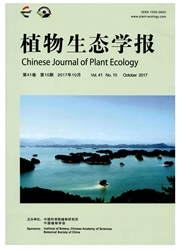

 中文摘要:
中文摘要:
近地面空气中的臭氧(O3)属于二次污染物,是由氮氧化物(NOx)和挥发性有机物(VOCs)等前体物在一定的环境条件下形成的。近年来,全球受O3污染的区域增加,污染程度也日趋严重。O3污染对植物的危害引起了国内外研究人员的广泛关注。众多研究发现,不同植物对O3的敏感性不同,其大小主要取决于植物自身的特性及环境因素;O3污染降低植物的净同化作用,减缓植物生长,改变同化物的分配,可对物种间的相互关系以及生态系统结构产生深远影响。该文在综述了国内外研究进展的基础上,提出我国在O3污染研究领域应深入研究以下几个方面:1)选育具有对O3污染抗性较强的植物尤其是作物品种;2)深入研究减轻O3污染对植物危害的栽培管理措施;3)加强研究O3污染对我国自然生态系统的影响;4)研究植被在治理O3污染中的积极作用。
 英文摘要:
英文摘要:
Ozone(O3)is highly beneficial in many ways,such as filtering ultraviolet radiation in the upper atmosphere,but O3 at ground level is a serious pollutant.High O3 concentration causes the damage to plants ranging from minimal visible symptoms to substantial inhibition of productivity,and species-or cultivar-specific responses exist.Interactions between plants and herbivorous insect pests or plant pathogens may be affected by O3.Decreased carbon flow above-and below-ground in high O3 environment could significantly decrease biodiversity.Therefore,O3 will affect terrestrial ecosystems substantially.The following aspects are suggested to be further studied in China:1)the comparison and selection of plant species or cultivars with high O3 resistance,2)the possible methods which can alleviate O3 damage to plants,3)O3 effects on the natural ecosystems in China,and 4)the positive function of vegetation in decreasing O3 pollution.
 同期刊论文项目
同期刊论文项目
 同项目期刊论文
同项目期刊论文
 期刊信息
期刊信息
